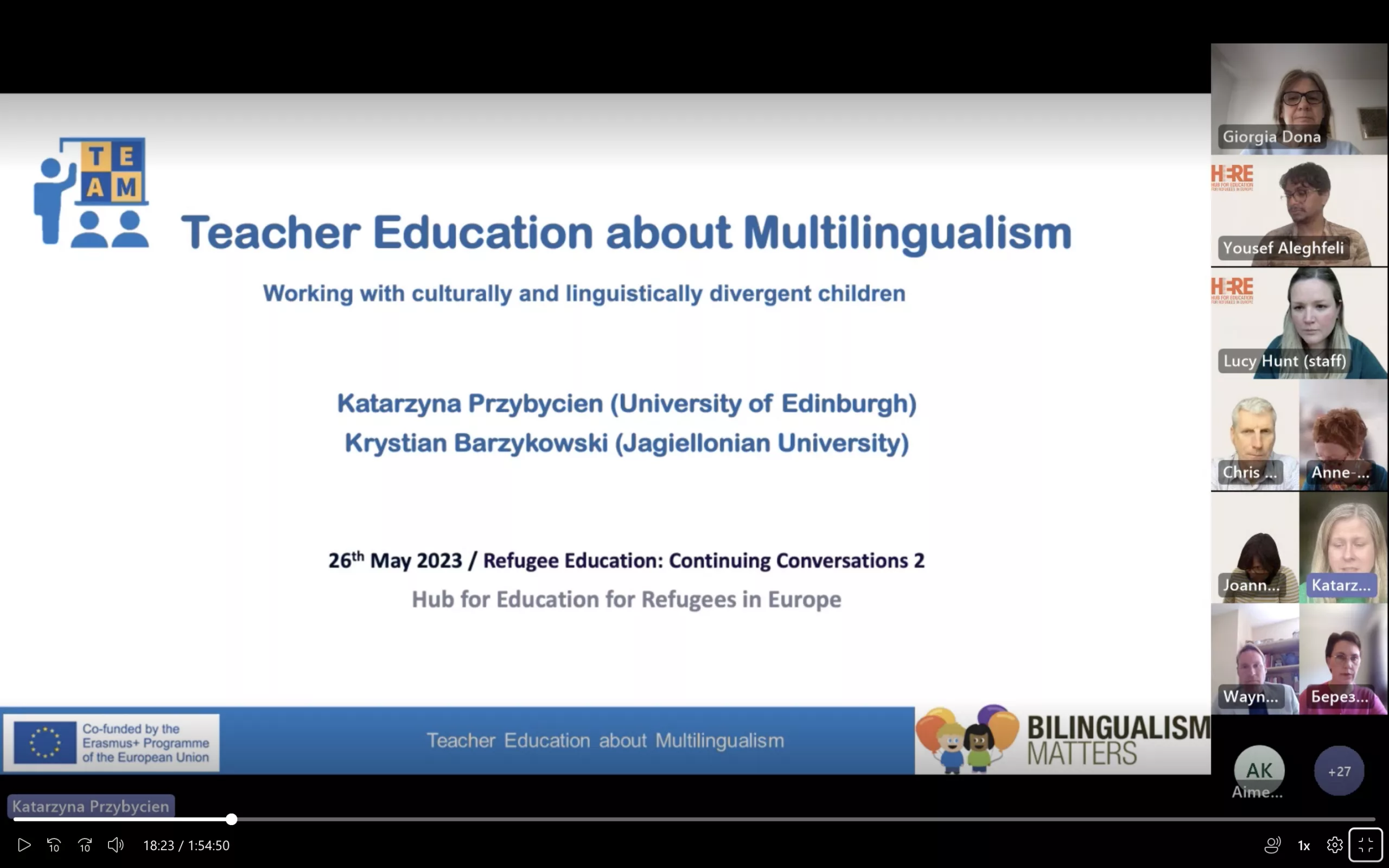On Friday 26th May 2023, the Hub for Education for Refugees in Europe (HERE) held our second webinar for members of the HERE Network and beyond to share information on a variety of refugee education projects from across Europe. The aim was to extend the critical conversations that were started at the Inaugural HERE Conference in 2022 and our first networking session in March 2023, and to provide a space for teachers, practitioners, academics, researchers and other interested parties to come together to learn, discuss and make connections.
WATCH THE RECORDING

Presentations
The online event included six lightning presentations:
Collaborative book project ‘De-bordering Higher Education: Refugees, Universities and Social Justice’
Giorgia Doná (University of East London)
This is a collaborative book project (Doná, Lounasmaa, Oddy, Squire and forced migrant learners) that adopts a social justice-oriented, anti-racist theory of refugee HE preparation. It draws on our experiences of four different but interlinked refugee HE preparation programmes in France, the UK, Jordan, Lebanon and Sudan, delivered both in-person and online. We developed a model for such preparation: the OMNI (Open, Multimodal, Narratively-based, Inclusive) model. OMNI is context-specific, yet it has the potential to be a transferrable best-practice model, nationally and internationally, for educational institutions, non-governmental organisations, policy-makers and cultural producers.
The difference schools make to the lives of uprooted children
Wayne Veck; Liudmyla Berezova; Julie Wharton (University of Winchester)
We live in a world where some 103 million people have been forced to flee their homes and are now living in internal or external displacement (UNHCR 2022). Bringing together three experts in the field of education, psychology, and refugee studies, this talk addresses our research into the difference schools make to the lives of children who have been uprooted from their homes. We have drawn on the voices of refugees, along with the experiences and insights of teachers. In this talk, we examine the education of refugee children and, crucially, demonstrate why this education can and must be inclusive.
Working with culturally and linguistically divergent children
Katarzyna Przybycien (University of Edinburgh); Krystian Barzykowski (Jagiellonian University)
The development of roadmaps and several ‘flow-charts’ demonstrating a selection of issues and factors which should be considered when working with culturally and linguistically divergent children in a classroom.
First-generation migrant family students in higher education in Finland
Golaleh Makrooni (Tampere University)
I am presenting some results of my doctoral thesis on the experiences and perceptions of first-generation migrant family students in higher education in Finland. This study could develop a grounded theory of “negotiation and repositioning process” based on the emergence of nine significant categories in the study.
Refugee-Led Research Hub Academic Bridging Programs
Annette Riziki; Sarah Salehi (Refugee-Led Research Hub)
The Refugee-Led Research Hub (RLRH) is an initiative of the Refugee Studies Centre (RSC) at the University of Oxford. RLRH supports individuals with lived experience of displacement to become leaders in humanitarian policy making and practice, and in academia, particularly in the field of Refugee and Forced Migration Studies. We do so by delivering academic bridging programmes to students worldwide who have been affected by displacement, supporting them to enrol in masters’ and doctoral degrees. We will provide an overview of the bridging programs, our learners, and some general challenges we encounter at the delivery and implementation level.
Film-making workshops for refugees
Bruce Bennett (Lancaster University)
I am preparing, with two colleagues, a short pilot series of film-making workshops for refugees who are housed in the local area. These will be run over 5-6 weeks at Lancaster University in collaboration with a local refugee support group, and will culminate in a screening of the resulting films.
Each presentation offered compelling approaches in trying to tackle various issues relating to refugee education – such as teacher toolkits for working with linguistically diverse children in the classroom – as well as discussing the challenges and practicalities of running courses for forced migrants. Presentations were interspersed with opportunities for all participants to discuss aspects of what they had heard in small, randomly selected breakout rooms which changed after 10 minutes. This provoked the development of interesting conversations to provide participants with jumping off points from which to continue them independently where they felt connections were beneficial and mutual interests could be nurtured.
Links to resources shared during the meeting
- ‘Art of Belonging’ project
- Refugee-Led Research Hub, Oxford
- ‘NEW ABC’ project
- ‘Bilingualism Matters’ project
- ‘Teacher Education about Multilingualism’ project
- MultiMind Policy Reports
- Makrooni, G., & Ropo, E. (2021). Academic Learners in Finland: The Experiences and Perceptions of First-Generation Migrant Family Students in Higher Education. Journal of Ethnic and Cultural Studies, 8(1), 85-106. http://dx.doi.org/10.29333/ejecs/597
- Makrooni. G. (2020). From challenge to empowerment: Cross cultural experiences and perceptions of First-Generation Migrant Family Student. Journal of Ethnic and Cultural Studies, 7(3), 112-128. http://dx.doi.org/10.29333/ejecs/522
- Makrooni. G. (2019). Being a First-Generation Migrant Family Student in Finland: Perceptions and Experiences of the Educational Journey to Higher Education. Journal of Ethnic and Cultural Studies, 6 (3), 157-170. http://www.ejecs.org/index.php/JECS/article/view/293
- Golaleh Makrooni PhD dissertation
- Parents/family and the migration context
We look forward to meeting together again in late July. All information on the next event will be shared via our Twitter (@hubHEREeurope) and newsletter (sign up here), and all are welcome!